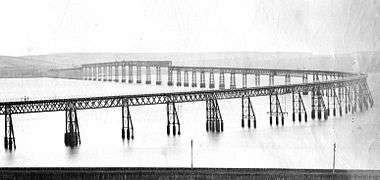1878 in Scotland
| |||||
| Centuries: |
| ||||
|---|---|---|---|---|---|
| Decades: |
| ||||
| See also: | List of years in Scotland Timeline of Scottish history 1878 in: The UK • Wales • Ireland • Elsewhere Scottish football: 1877–78 • 1878–79 | ||||
Events from the year 1878 in Scotland.
Incumbents
Law officers
Judiciary
- Lord President of the Court of Session and Lord Justice General – Lord Glencorse
- Lord Justice Clerk – Lord Moncreiff
Events

Original Tay Bridge from the north
- 14 January – Alexander Graham Bell demonstrates the telephone to Queen Victoria.[1]
- 15 March – restoration of the Scottish hierarchy of the Roman Catholic Church, carried out on the instructions of the newly appointed Pope Leo XIII.
- 31 May – the North British Railway's first Tay Bridge across the Firth of Tay is ceremonially opened, its engineer, Thomas Bouch, being made a burgess of Dundee. Designed in iron to replace a train ferry, it is the world's longest bridge at this date.[2]
- 12 December – the iron-hulled full-rigged ship Falls of Clyde is launched at Russell & Company's yard at Port Glasgow for Wright and Breakenridge's Glasgow-based Falls Line. In 1968 she will be laid up as a museum ship in Honolulu.
- Sophia Jex-Blake sets up in practice in Edinburgh as the city's first woman doctor.
- The hydropathic establishment in Moffat is opened.
- Construction of forts on Inchkeith begins.
- West coast shipping operator David Hutcheson & Co. passes wholly to control of David MacBrayne.
- The sanitary porcelainware works at Barrhead that becomes part of Armitage Shanks is established.
Births
- 20 January – Finlay Currie, actor (died 1968 in England)
- 23 March – Muirhead Bone, graphic artist (died 1953 in England)
- 12 April – Alex McDonald, footballer (died 1949)
- 24 July – Louisa Jordan, nurse (died 1915 in Serbia)
- 10 August – Louis Esson, poet and playwright (died 1943 in Australia)
- 14 December – James Greenlees, rugby union footballer, educationalist and soldier (died 1951)
- Robert Freeman, Baptist minister in the United States
- George Wittet, architect (died 1926 in Bombay)
Deaths
- 26 January – Kirkpatrick Macmillan, inventor of the bicycle (born 1812)
- 19 February – George Paul Chalmers, painter (born 1833; died as the result of a street attack)
- 6 June – Robert Stirling, Church of Scotland minister and inventor of the Stirling engine (born 1790)
- 13 August – George Gilfillan, writer and poet (born 1813)
- 5 December – George Whyte-Melville, novelist and poet (born 1821)[3]
- 31 December – James Matheson, Member of Parliament and co-founder of Jardine, Matheson & Co. (born 1796)
The arts
- July – William McGonagall journeys on foot from Dundee to Balmoral Castle over mountainous terrain and through a violent thunderstorm in a fruitless attempt to perform his verse before Queen Victoria.[4]
gollark: That's just stupid.
gollark: <@!111569489971159040> Seriously, why is the backend for it closed-source, then?
gollark: Anyway, <@!111569489971159040>, please explain yourself.
gollark: I think it's the text.
gollark: What? You are making less sense than tjwld.
References
- Penguin Pocket On This Day. Penguin Reference Library. 2006. ISBN 0-14-102715-0.
- Thomas, John (1969). The North British Railway. 1. Newton Abbot: David & Charles. ISBN 0-7153-4697-0.
- stanford.edu
- Autobiographical account published in his More Poetic Gems.
This article is issued from Wikipedia. The text is licensed under Creative Commons - Attribution - Sharealike. Additional terms may apply for the media files.
